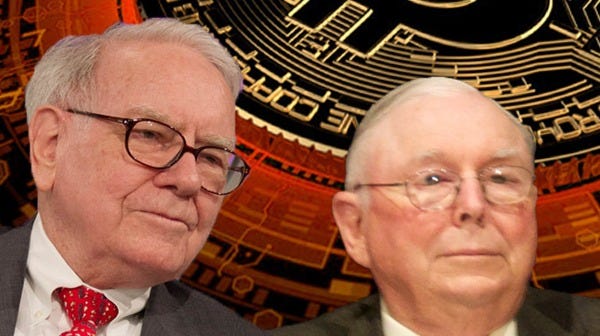Is blockchain's transformative potential being stifled by regulatory uncertainty and industry skepticism?
Abraham George Crypto Musings
Billionaire investor Charlie Munger's disdain for cryptocurrencies is well known, so much so that he has declared anyone who disagrees with his position to be "idiots," rendering discussions on the matter impossible. While Munger's opinion is respected, it is worth noting that blockchain technology is poised to have a transformative impact on the financial industry, with the potential to outstrip even the internet in significance. Blockchain's distributed network has the ability to enable individuals to store and transfer assets, rather than simply distributing information as the internet does.
As we saw with the dotcom bubble, the initial fervor for a new technology may not always lead to sustainable growth. However, amidst the hype, there are projects with potential that investors can capitalize on. The lack of regulatory clarity, which has resulted in the industry being treated as high-growth stocks, has caused market caps and valuations to decrease in a weakening economy and rising interest rate environment. The SEC's current stance is that most cryptocurrencies are securities and should be regulated as such. Unfortunately, the industry has seen an antagonistic and hostile regulatory environment since the creation of Bitcoin, with the SEC choosing to regulate through enforcement rather than a regulatory framework. This approach does not incentivize innovation and has led to billions of dollars being invested overseas instead of in the US.
It is time for Congress to intervene and provide a clear-cut regulatory framework for this nascent industry. Although there have been scams and frauds, with no regulatory framework in place, one should not discount the potential for growth and innovation in this space. Rather, it is essential to undertake extensive research and focus solely on utility tokens. Payment tokens that form the foundation for tokenization, cross-border transactions, and on-demand liquidity are particularly promising, given that more than 100 countries are working on CBDC projects. However, it is worth noting that a digital dollar will be government-owned and controlled, rather than being part of the private industry.
The SEC's use of the Howey test, which dates back more than 75 years, to determine whether something is a security or not is a source of significant confusion. While this test was designed to evaluate investment contracts for oranges, it is outdated and not relevant to the current digital asset environment. The ongoing Ripple case, which has been in deliberation for almost three years, has further highlighted this problem. The case may be settled by March 20th, 2023, or it may be sent to the Supreme Court for a jury trial. If it goes to the Supreme Court, it could be several years before we receive a new test that supersedes the Howey test. However, the strong belief is that Ripple will win the case, which will provide regulatory clarity to the digital space for the first time.
In conclusion, while Munger's opinion is respected, it is essential to recognize the transformative potential of blockchain technology. A clear-cut regulatory framework will be necessary to realize this potential and incentivize innovation. With extensive research and a focus on utility tokens, investors can capitalize on the promising growth opportunities in the digital asset space.
If you received value from this post, and you’d like to send some back, or if you’d like to signal to me to continue spending time on these types of explorations, feel free to buy me coffees (thank you!):
So, there we go. Thanks for reading Breezy Briefings. If you enjoyed this, I'd really appreciate it if you could take a second and tell a friend. Honestly. It makes such a big difference.
Forward this email. Recommend the newsletter. Share on Twitter, WhatsApp, Telegram, LinkedIn, Slack, wherever!
Join Breezy Briefings’ Official Telegram Channel: https://t.me/BreezyBriefings
Abraham George is a seasoned investment manager with more than 40 years of experience in trading & investment and multi-billion dollar portfolio management spanning diverse environments like banks (HSBC, ADCB), sovereign wealth fund (ADIA), a royal family office, and a hedge fund.



